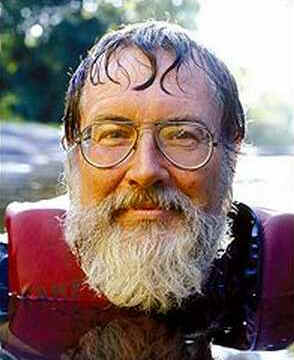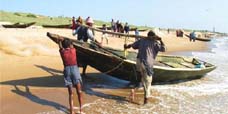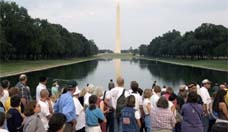
The James river is the key to Richmond's past and Richmond's future. Meet the key to the river: James River Park's Naturalist Ralph White (RPCV Thailand)
The Great White Way
The river is the key to Richmond's past and Richmond's future. Meet the key to the river: James River Park's Naturalist Ralph White.
Holly Timberline
Tuesday June 29, 1999
Ralph White remembers picking berries with his mom when he was a boy in New England. They followed the hard-to-walk routes to the best berries in the woods and were so busy collecting that they nearly bumped right into another mother and child, also picking berries. Only these two were bears. Heart pounding, young White followed his distressed mother's lead, backing away slowly to safety.
Years later, he recalls the incident not as a close call but as a moment of connection. 'It was two families meeting together,' he says. 'And for the same reason. Because the berries were good.'
In the nearly 20 years that White, 55, has served as manager and naturalist for the James River Park System, his actions have been guided by that same underlying idea of interconnectedness. 'All the rules that apply to mice apply to men,' he says. 'We don't see ourselves as a part of this overall natural setting, but we are.'
White's job encompasses an unending range of duties, which he performs on the scantiest of budgets: natural resource management, event planning, historical restoration, volunteer coordinating. But his true gift, say those who work with him, is his ability to bring people and nature together in a way that enriches both.
'Ralph is just one of these people who loves nature. It's almost like a religion to him,' says John Coe, president of the Richmond Audubon Society. 'He knows the water, the ripples, everything on the bank.' But it's not just White's knowledge that makes him so effective, Coe says: 'A lot of people have the background. He can also relate his feelings to whoever he's teaching.'
Coe says that White's ability to teach and inspire has helped bring about the renewed health of the James. 'The river has really made a comeback in the past 10 years,' Coe says. 'Ralph has worked very hard locally to make citizens aware of how important the river is.'
Mayor Tim Kaine agrees. 'Ralph is passionate about his beliefs about the river, and he's a very good educator. He's a great salesman for how important it is to maintain it in its natural way. ' I can't think of any person who's had more influence than Ralph, he's been key in the improvements.'
The river's thriving wildlife populations attest to White's efforts. Bald eagles, once close to extinction, now soar through town in record numbers. The James River is known as the richest site of bald eagles on the East Coast, and White says Richmond is the only capital city in the lower 48 states with nesting bald eagles inside the city limits. Fish are abundant, as are the ospreys, cormorants and herons who eat them. And White nearly giggles as he talks about the pond on Belle Isle: 'There are wild otters in downtown Richmond!'
The riverfront has never been more in the spotlight for humans, either. With the city attempting to develop the downtown canal area into a true waterside attraction, our economic survival may very well depend upon a thriving, healthy river as much as our physical survival once did.
A recent spring afternoon finds White exactly in his element ' guiding a group of students on a tour of Belle Island. Today's group is preteen girls from Collegiate, the topic, geology.
Fuzzy-tipped reeds and low-growing greens bask in the humidity, giving off a dank, slightly fetid smell. Blossoming thickets of honeysuckle sweeten the air.
The girls are in denim shorts and T-shirts, their hair pulled back in scrunchies. They carry backpacks and little cameras, and some swig water from brightly colored bottles.
White wears black hiking shorts with loads of pockets, and a white, collared T-shirt. His blue-striped tube socks are covered with burrs, and a chain full of jangling keys snakes from his belt into his pocket.
'Everyone here has been affected by these rocks,' White says, as the group stands a pebble's throw from the raging rapids, 'and I aim to prove it to you in the next hour.' The girls cluster around him as he explains basic plate tectonics. Like any good educator, he draws the answers from them, rather than pumping the information in: 'North America was heavy, Africa was not. Which went down''
He's explaining one of this area's most distinctive geologic features, the fall line, a 1,000-mile ribbon of granite that runs from New Jersey to Georgia. Geologists say the fall line resulted from a collision between two continental plates. It erodes more slowly than the surrounding rock, and where it intersects the James, the resulting drop produces rapids. The water power generated by the rapids has made Richmond attractive to settlers throughout history.
White leads the girls down a path towards the heart of the island, pointing out that stone from this area has been used for downtown Richmond's walkways, cobblestone roads, gravestones and even buildings.
'Oh, I love this!' he calls suddenly, in a deep singsongy voice. The water-willow ' also called the miniature leprechaun orchid ' is newly flowering. Just three days ago, he marvels, there was nothing more to this plant than its thick, grassy leaves. Now it has sent up skinny stems bearing purple and white blooms.
On the way out, White asks the girls to carry out a single piece of litter each, and they become quite obviously consumed with hauling out all the trash they can carry. One girl picks up a Budweiser can gone yellow with sun and age. Another gingerly lifts a rusted soda can, transferring a muddy, faded chip bag to the other hand.
White concludes his talk near the picnic tables where the girls will eat lunch. 'So you see'' he says. 'These rocks affect your recreation, your ancestors' employment, your energy, transportation, buildings ....' With only a bit of teacher prompting, the girls thank him. He returns the sentiment, indicating the garbage they have collected. 'This is a cleaner and a nicer place than it was before, thanks to you,' he says.
Belle Isle epitomizes both White's approach to park management and its success. Even 10 years ago, Belle Isle was not a pretty place. People got drunk in broad daylight, fighting and rowdiness was common, and broken glass littered the rocks. In 1991, the foot access bridge from Tredegar Street to the island was constructed, and nobody knew quite what to expect. 'A huge change took place,' White remembers. 'Suddenly there were mass quantities of people coming to Belle Isle.' He was concerned that the 'rough element' would prey on hapless secretaries and others out for a lunchtime stroll. 'But lo and behold, the reverse took place,' he says. The tough guys still hung out on the rocks. But the more upscale lunchtime crowd was often armed with cell phones, and when they saw aberrant behavior, they reported it. 'The quality of the usership went up,' White explains. It was the opposite of the 'one bad apple spoils the bunch' theory, he says, and it demonstrated that 'all you need to do is provide the right kind of access for your target audience,' an approach that has since become a basic tenet of White's approach to park management.
One of the park's worst problems in the past was all the broken glass. 'It hurts people for weeks,' White says. 'It has a disproportionate impact.' The Richmond Times-Dispatch reported that in 1980, there was an average of seven ambulance calls per week due to park visitors cutting their feet on broken glass. Though there is still some glass to be found, the incidence has been greatly reduced. It's not uncommon now to spend an entire day on Belle Isle without spotting any broken glass at all.
It's not Utopia, of course. You can still find drinking and other types of misbehavior, if you look for it. But White has a live-and-let-live attitude toward some of that. 'It's in a different category than crimes that hurt other people,' White says. 'We're managing for the user. We're not the Christian temperance league. We're not the anti-dope alliance.'














